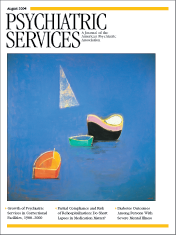Evidence is emerging that early and assertive intervention for first episodes of psychosis can improve the natural course of these disorders. With early intervention, patients experience better outcome in terms of overall quality of life and social functioning, have shorter average hospital stays, and receive lower dosages of antipsychotics.
ETHOS (Early Treatment and Home-based Outreach Service) is a new specialist service that offers a two-year comprehensive and integrated package of community-based care for persons aged 17 to 30 years living in South West London (total population 627,000) who are experiencing a first episode of psychosis. This area is socioeconomically and ethnically diverse and has an annual incidence of first-episode psychosis of 21 per 100,000 population. ETHOS has nine multidisciplinary staff, including seven full-time-equivalent care coordinators, a half-time consultant psychiatrist, a junior physician, a full-time vocational officer, and a team secretary. Each care coordinator carries a maximum caseload of 12 patients.
ETHOS was developed after a survey of the existing services in south and west London revealed poor provision of effective interventions for first-episode cases. From the inception of ETHOS, a steering group comprising clinicians, managers, and user and caregiver representatives has guided the development of ETHOS and its policies. Service aims are explicitly stated in the operational policy, which is regularly reviewed as the team gains experience.
ETHOS aims to accelerate remission through interventions, to minimize the individual's adverse reactions to the experience of psychosis, to promote and consolidate recovery, to maximize social and occupational functioning, and to provide all services in the patients' own environments, usually their homes. Caregivers are seen as therapeutic allies, and their needs are also assessed and met. The care package consists of therapeutic engagement, low-dosage atypical antipsychotics, psychoeducation, individual psychotherapy, relapse prevention, vocational assistance, family or caregiver support, and help with accommodation and benefits. Information leaflets detailing the structure and functioning of the team and the services offered are provided to all patients and their families. The service is flexible, proactive, responsive, and culturally sensitive. Management structures, supervision, roles and responsibilities, and accountability have been consensually reached and are clearly outlined in the team's operational policy.
ETHOS began providing services in July 2001. It functions from 9 a.m. to 5 p.m. on weekdays, with the local crisis line and home treatment team providing after-hours coverage. ETHOS accepts referrals from all secondary mental health services, including adult community mental health teams, child and adolescent teams, and liaison psychiatry services. Diagnostic uncertainty is not considered a hindrance, and early referrals are encouraged, even when the clinical picture is unclear and the presence of psychosis equivocal. Refusal to comply with medication is not seen as grounds for disengagement. Rather, the patient is allowed to make choices about care, and the need for medication is discussed regularly. All cases are reviewed during team meetings on a regular basis, and both generic and specialist inputs are offered as appropriate. In cases in which inpatient care is needed, patients are admitted under the care of the referring teams.
A review of case notes from the first 18 months of the service has revealed that, compared with their care under generic services, ETHOS patients have shorter inpatient stays, fewer risk behaviors, more structured daytime activity, and a greater frequency of contact with their care coordinators. Most patients have been discharged back to the care of general practitioners rather than mental health services. The service is safely and successfully managing patients in the community with only modest resources.
The key ingredients of success appear to be ensuring engagement, which includes adherence to treatment, and engendering hope among patients and their caregivers. A major emphasis has been the education of patients and their caregivers on the nature, causes, treatment, and outcome of psychosis. The team has an agreed and shared understanding of the education package, and all members consistently provide the same message to patients about etiology and treatment. Motivational interviewing regarding medication compliance and substance misuse has been a crucial skill for team members, and, when needed, extra training has been offered. There has been little staff turnover, and user and caregiver feedback about the service has been very positive. Caregivers have strongly demanded that the service incorporate early detection and accept referrals directly from primary providers. In addition, the team is planning to establish its own "youth-friendly" inpatient service.

